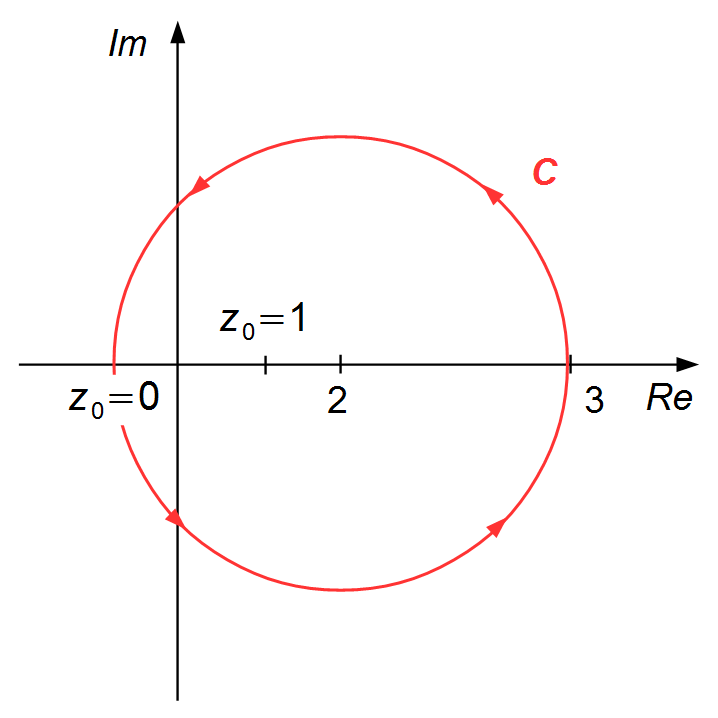Solved Problem on Cauchy's Integral Formula
advertisement
f) \( \displaystyle \oint_{|z-2|=3}\frac{\operatorname{e}^{z}}{z^{3}(z-1)}\;dz \)
The path of integration is given by the circle of radius 3, centered at the point (2, 0), traversed
counterclockwise (Figure 1).
The general form of Cauchy's Integral Formula is given by
The general form of Cauchy's Integral Formula is given by
\[
\begin{gather}
\bbox[#99CCFF,10px]
{f^{(n)}(z_{0})=\frac{{n}!}{2\pi \mathrm{i}}\;\oint_{{C}}\frac{f(z)}{\left(z-z_{0}\right)^{n+1}}\;dz} \tag{I}
\end{gather}
\]
Identifying the terms of the integral
\[
\begin{gather}
\frac{{
\bbox[#FFCC66,2px]
{n}
}!}{2\pi \mathrm{i}}\;\oint_{{C}}\frac{
\bbox[#FFFF66,2px]
{f(z)}
}{\left(z-
\bbox[#FFD9CC,2px]
{z_{0}}
\right)^{
\bbox[#FFCC66,2px]
{n}
+1}}\;dz=\underbrace{\oint_{{C_{1}}}
\bbox[#FFFF66,2px]
{{\frac{\operatorname{e}^{z}}{z^{3}}}}
\frac{1}{(z-
\bbox[#FFD9CC,2px]
{1}
)^{
\bbox[#FFCC66,2px]
{0}
+1}}\;dz}_{I_{1}}+\underbrace{\oint_{{C_{2}}}
\bbox[#FFFF66,2px]
{{\frac{\operatorname{e}^{z}}{(z-1)}}}
\frac{1}{(z-
\bbox[#FFD9CC,2px]
{0}
)^{
\bbox[#FFCC66,2px]
{2}
+1}}\;dz}_{I_{2}}
\end{gather}
\]

the points \( z-1 \Rightarrow z=1 \) and z = 0, which lie inside the region determined by de closed contour C, will be used in the calculation of the integral we have \( f_{1}(z)=\frac{\operatorname{e}^{z}}{z^{3}} \), z0 = 1 and n = 0, and \( f_{2}(z)=\frac{\operatorname{e}^{z}}{z-1} \), z0 = 0 and n = 2, writing the expression (I) for each of the integrals
\[
\begin{gather}
\oint_{{C}}\frac{f(z)}{\left(z-z_{0}\right)^{n+1}}\;dz=\frac{2\pi\mathrm{i}}{n!}\;f^{(n)}(z_{0})\\[5pt]
I_{1}=\oint_{{C_{1}=1}}\frac{\operatorname{e}^{z}}{z^{3}(z-1)}\;dz=\frac{2\pi\mathrm{i}}{0!}\;f_{1}^{(0)}(1)\\[5pt]
I_{1}=2\pi\mathrm{i}\;\frac{\operatorname{e}^{1}}{1^{3}}\\[5pt]
I_{1}=2\pi\operatorname{e}\mathrm{i} \tag{II}
\end{gather}
\]
\[
\begin{gather}
\oint_{{C}}\frac{f(z)}{\left(z-z_{0}\right)^{n+1}}\;dz=\frac{2\pi\mathrm{i}}{n!}\;f^{(n)}(z_{0})\\[5pt]
I_{2}=\oint_{{C_{1}=1}}\frac{\operatorname{e}^{z}}{z^{3}(z-1)}\;dz=\frac{2\pi\mathrm{i}}{2!}\;f_{2}^{(2)}(0)
\end{gather}
\]
Calculation of the second derivative of
\( \displaystyle f_{2}(z)=\frac{\operatorname{e}^{z}}{z-1} \)
The function f(z) is the ratio of two functions, using the quotient rule
The function f(z) is the ratio of two functions, using the quotient rule
\[
\begin{gather}
\left(\frac{u}{v}\right)^{\large '}=\frac{u' v-uv'}{v^{2}}
\end{gather}
\]
where
\( u(z)=\operatorname{e}^{z} \)
and
\( v(z)=z-1 \)
\[
\begin{gather}
\frac{df}{dz}=\frac{\frac{d\left(\operatorname{e}^{z}\right)}{dz}(z-1)-\left(\operatorname{e}^{2}\right)\frac{d(z-1)}{dz}}{(z-1)^{2}}\\[5pt]
\frac{df}{dz}=\frac{\operatorname{e}^{z}(z-1)-\operatorname{e}^{2}(1)}{(z-1)^{2}}\\[5pt]
\frac{df}{dz}=\frac{\operatorname{e}^{z}(z-1-1)}{(z-1)^{2}}\\[5pt]
\frac{df}{dz}=\frac{\operatorname{e}^{z}(z-2)}{(z-1)^{2}}
\end{gather}
\]
second differentiation and applying the quotient, where
\( u(z)=\operatorname{e}^{z}(z-2) \)
and
\( v(z)=(z-1)^{2} \)
\[
\begin{gather}
\frac{d^{2}f}{dz^{2}}=\frac{\frac{d\left[\operatorname{e}^{z}(z-2)\right]}{dz}(z-1)^{2}-\left[\operatorname{e}^{2}(z-2)\right]\frac{d(z-1)^{2}}{dz}}{\left[(z-1)^{2}\right]^{2}}
\end{gather}
\]
the function u(z) is a product of two functions, using the product rule
\[
\begin{gather}
(gh)'=g' h+gh'
\end{gather}
\]
where
\( g(z)=\operatorname{e}^{z} \)
and
\( h(z)=(z-2) \),
and the function v(z) is a composite function, using the Chain Rule
\[
\begin{gather}
\frac{dp[q(z)]}{dz}=\frac{dp}{dq}\frac{dq}{dz}
\end{gather}
\]
where
\( p(q)=q^{2} \)
and
\( q(z)=(z-1) \)
\[
\begin{gather}
\frac{d^{2}f}{dz^{2}}=\frac{\left\{\frac{d\left[\operatorname{e}^{z}(z-2)\right]}{dz}\right\}(z-1)^{2}-\left[\operatorname{e}^{2}(z-2)\right]\left\{\frac{d(z-1)^{2}}{dz}\right\}}{\left[(z-1)^{2}\right]^{2}}\\[5pt]
\frac{d^{2}f}{dz^{2}}=\frac{\left\{\frac{d\left(\operatorname{e}^{z}\right)}{dz}(z-2)+\operatorname{e}^{z}\frac{d(z-2)}{dz}\right\}(z-1)^{2}-\left[\operatorname{e}^{2}(z-2)\right]\left\{\frac{d(q)^{2}}{dq}\frac{d(z-1)}{dz}\right\}}{\left[(z-1)^{2}\right]^{2}}\\[5pt]
\frac{d^{2}f}{dz^{2}}=\frac{\left\{\left(\operatorname{e}^{z}\right)(z-2)+\operatorname{e}^{z}(1)\right\}(z-1)^{2}-\left[\operatorname{e}^{2}(z-2)\right]\left\{(2q)(1)\right\}}{(z-1)^{4}}\\[5pt]
\frac{d^{2}f}{dz^{2}}=\frac{\operatorname{e}^{z}(z-2)(z-1)^{2}+\operatorname{e}^{z}(z-1)^{2}-\operatorname{e}^{2}(z-2)\left\{2(z-1)\right\}}{(z-1)^{4}}\\[5pt]
\frac{d^{2}f}{dz^{2}}=\frac{\operatorname{e}^{z}(z-2)(z-1)^{2}+\operatorname{e}^{z}(z-1)^{2}-2\operatorname{e}^{2}(z-2)(z-1)}{(z-1)^{4}}\\[5pt]
\frac{d^{2}f}{dz^{2}}=\frac{\operatorname{e}^{z}(z-1)\left[(z-2)(z-1)+(z-1)-2(z-2)\right]}{(z-1)^{4}}\\[5pt]
\frac{d^{2}f}{dz^{2}}=\frac{\operatorname{e}^{z}\left[z^{2}-z-2z+2+z-1-2z+4\right]}{(z-1)^{3}}\\[5pt]
\frac{d^{2}f}{dz^{2}}=\frac{\operatorname{e}^{z}\left[z^{2}-4z+5\right]}{(z-1)^{3}}
\end{gather}
\]
\[
\begin{gather}
f_{2}^{(2)}(z)=\frac{\operatorname{e}^{z}\left[z^{2}-4z+5\right]}{(z-1)^{3}}
\end{gather}
\]
\[
\begin{gather}
I_{2}=\frac{2\pi\mathrm{i}}{2.1}\;\frac{\operatorname{e}^{0}\left[0^{2}-4\times 0+5\right]}{(0-1)^{3}}\\[5pt]
I_{2}=-5\pi\mathrm{i} \tag{III}
\end{gather}
\]
the result of the integral will be given by the sum of expressions (II) and (III)
\[
\begin{gather}
\oint_{|z-2|=3}\frac{\operatorname{e}^{z}}{z^{3}(z-1)}\;dz=I_{1}+I_{2}\\[5pt]
\oint_{|z-2|=3}\frac{\operatorname{e}^{z}}{z^{3}(z-1)}\;dz=2\pi\operatorname{e}\mathrm{i}+(-5\pi \mathrm{i})
\end{gather}
\]
\[
\begin{gather}
\bbox[#FFCCCC,10px]
{\oint_{|z-2|=3}\frac{\operatorname{e}^{z}}{z^{3}(z-1)}\;dz=\pi\mathrm{i}(2\operatorname{e}-5)}
\end{gather}
\]
advertisement

Fisicaexe - Physics Solved Problems by Elcio Brandani Mondadori is licensed under a Creative Commons Attribution-NonCommercial-ShareAlike 4.0 International License .